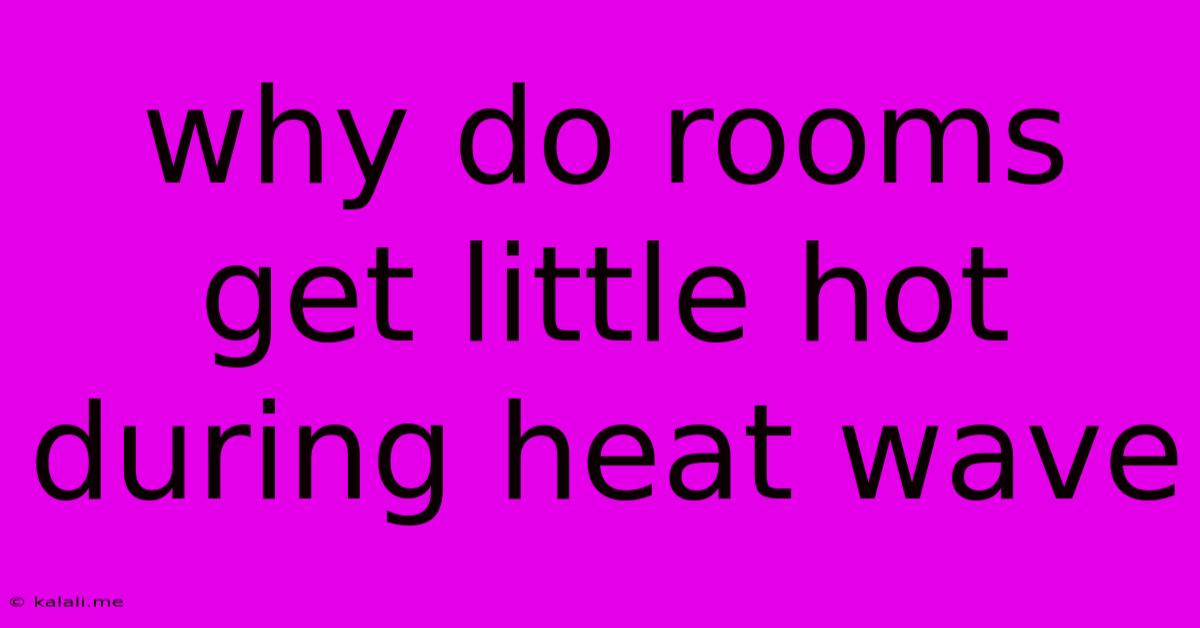Why Do Rooms Get Little Hot During Heat Wave
Kalali
May 31, 2025 · 3 min read

Table of Contents
Why Do Rooms Get Hot During a Heatwave? Understanding the Science of Summer Heat
Heatwaves are a brutal reminder of the sun's power. Even with air conditioning, many find their rooms stubbornly refusing to cool down, leaving them feeling uncomfortable and restless. But why exactly do rooms heat up so much during a heatwave? It's a combination of factors, all stemming from the basic principles of heat transfer. This article will explore the science behind rising room temperatures during periods of extreme heat, offering insights into how to mitigate the problem.
The Sun's Unrelenting Radiative Heat: The most obvious culprit is the sun itself. Its radiant energy, in the form of infrared radiation, directly penetrates windows and walls, warming the interior. The intensity of this radiation is significantly higher during a heatwave, leading to a rapid increase in room temperature. Darker-colored surfaces absorb more heat than lighter ones, exacerbating the problem. This is why rooms with south-facing windows often experience the most drastic temperature increases.
Understanding Heat Transfer: Conduction, Convection, and Radiation
Three main processes contribute to the heating of a room during a heatwave:
-
Radiation: As mentioned above, the sun's radiation is a primary source of heat gain. Other heat-radiating objects within the room, such as appliances and even people, also contribute to the overall temperature.
-
Conduction: Heat travels through physical contact. If your walls, floor, or ceiling are exposed to direct sunlight or are in contact with hot exterior surfaces, this heat will conduct into the room, slowly increasing its temperature. Materials with high thermal conductivity, like metal, transfer heat more readily than those with low conductivity, like wood.
-
Convection: This involves the movement of air. Hot air rises, and as the air inside your room heats up, it rises and is replaced by cooler air. This creates a cycle, continually warming the room. This effect is amplified during a heatwave due to the already high external temperatures.
Other Factors Contributing to Increased Room Temperature:
-
Building Materials: The thermal mass and insulation of your building materials play a significant role. Buildings constructed with materials that retain heat will take longer to cool down and will experience greater temperature fluctuations.
-
Air Leaks: Inefficient sealing around windows and doors allows hot outside air to seep into your room, counteracting any cooling efforts.
-
Appliances: Appliances that generate heat, such as ovens, stoves, and computers, add to the overall warmth of the room.
Mitigating the Heat: Practical Solutions
While completely eliminating heat gain is nearly impossible during a heatwave, several strategies can help minimize the temperature increase:
-
Close Curtains and Blinds: This simple step can significantly reduce the amount of solar radiation entering your room.
-
Use Reflective Materials: Consider using reflective window films or blinds to bounce sunlight away from your windows.
-
Improve Insulation: Investing in better insulation can significantly reduce heat transfer through walls, ceilings, and floors.
-
Increase Ventilation (Strategically): Open windows during cooler parts of the day (usually early morning or late evening) to allow for air circulation. Close them during the hottest parts of the day to prevent hot air from entering.
-
Utilize Fans: Fans circulate the air, creating a cooling breeze and enhancing the effectiveness of air conditioning if you have it.
By understanding the science behind why rooms heat up during a heatwave, you can better prepare and employ effective strategies to stay comfortable during these challenging periods. Remember, a multifaceted approach combining several of these solutions will yield the best results in keeping your living space cool and comfortable.
Latest Posts
Latest Posts
-
How To Turn An Amide Into A Good Leacing Group
Jun 02, 2025
-
Fire Alarm Beeping Every 30 Seconds
Jun 02, 2025
-
How Far Can You Travel On Horseback In A Day
Jun 02, 2025
-
How Do I Remove Rust From Clothing
Jun 02, 2025
-
Will A T8 Fit A T12
Jun 02, 2025
Related Post
Thank you for visiting our website which covers about Why Do Rooms Get Little Hot During Heat Wave . We hope the information provided has been useful to you. Feel free to contact us if you have any questions or need further assistance. See you next time and don't miss to bookmark.